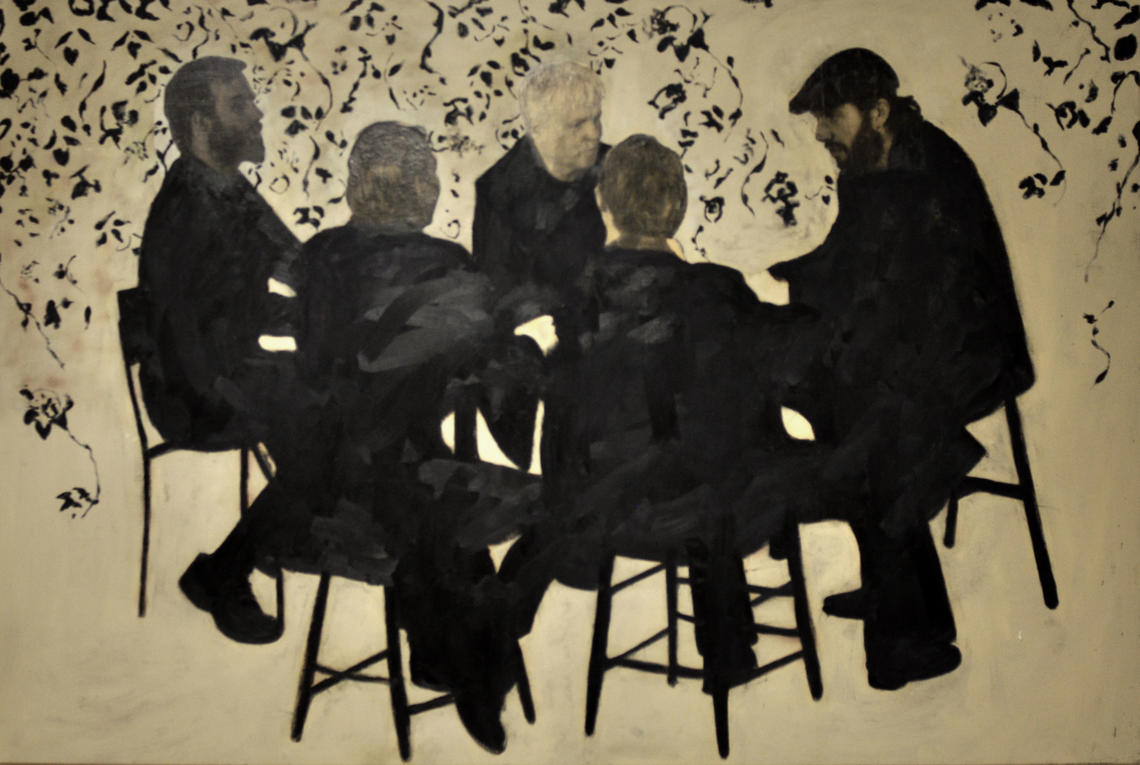Jan. 14, 2022
Truth and consequences: UCalgary’s Nickle Galleries tackles contemporary identity and conflict

Challenges to global order and fallout from colonial occupation are being addressed on campus this winter in two new visual art exhibitions. The Age of Uncertainty by Sandra Sawatzky and No Photos… No Recordings… No Notes… Brian Flynn Repainting the Troubles open at Nickle Galleries in the Taylor Family Digital Library on Jan. 17, running until April 9, 2022.
The Age of Uncertainty is an installation consisting of 12 hand-embroidered panels that explore the dramatic stories that tend to keep us awake at night. Sawatzky is a researcher, storyteller, visual artist and embroiderer who explores big ideas with a very small needle and miles of thread. Drawing inspiration from art, literature, science, and the media, Sawatzky juxtaposes insightful, sometimes prognostic quotes alongside scenes of optimism and despondency.
Panels explore, for example, overpopulation, surveillance, corruption, nuclear threat and climate change. Four years in the making, The Age of Uncertainty explores our assumptions and aspirations as well as their social, political and environmental consequences.
“My intent with The Age of Uncertainty is to convince people to pay attention to the dark matters of life that affect all of us. I thought that what can’t be done with solemn lectures and mountains of data preached by sober prophets, might be possible with humour, and a fine needle and thread,” Sawatzky notes.
Sawatzky is not the first artist to explore dramatic events with needle and thread — indeed, the 11th century Bayeux Tapestry depicts the Norman conquest of England. Her work falls within traditions of monumental pictorial textiles created to demonstrate, commemorate and instruct. It also falls within evolving traditions of embroidery as subversive and engaging in social critique. Her previous project, The Black Gold Tapestry, continues to tour internationally.
Exhibition curator Michele Hardy says, "That embroidery — a craft still often considered domestic, feminine, and mindless — is used to skillfully probe some of the most pressing issues of our time is as unexpected as it is strategic."
The adjacent exhibition lays bare the experiences of an artist impacted by paramilitary violence between colonial occupiers and colonised revolutionaries. No Photos… No Recordings… No Notes… Brian Flynn Repainting the Troubles features paintings by Calgary-based Irish-Canadian Brian Flynn. As a witness to colonial and sectarian violence in Northern Ireland — an era known as the Troubles — Flynn confronts some of the harshest realities of the human condition: fear, conflict and uncertainty.

Brian Flynn, The Meeting, 2018. Oil and photo transfer on canvas mounted over plywood. Collection of Nickle Galleries, University of Calgary.
Dick Averns
The outcome is a large body of art based on his family’s connections to paramilitary activity, and extensive research including interviews with former members of the Irish Republican Army (IRA). Flynn’s artworks are augmented with a collection of material culture including original newspaper photographs, propaganda, folk art, ammunition, and street furniture.
The value of Flynn’s art comes from his willingness to share difficult memories: hushed family gatherings, ambushes outside his Catholic grandparents’ cottage, and stories of militia business conducted in domestic settings. Although his leanly painted figurative works are unsettling, they provide a compelling way of finding a pathway to acceptance.
Notably, Flynn’s work is the research focus of an English Anglican who experienced the Troubles as a Londoner in Britain’s capital. Curator Dick Averns, a specialist in contemporary war art, remarks: “In a time of global instability between superpowers, and a renewed uncertainty over the border status between Northern Ireland and the rest of the U.K. because of Brexit, it’s important to confront violence, however dark, and find common ground.”
Brian Flynn echoes the need for suspending judgment: “I’m not taking any sides in this. Nor am I interested in taking sides. At all. There’s enough other people doing that.”
The Age of Uncertainty and No Photos… No Recordings… No Notes… Brian Flynn Repainting the Troubles offer powerful testaments to the power of art to navigate conflict, highlighting the value of the humanities in scholarly research. Collectively, these new exhibitions visualize Antje Ellermann’s telling treatise that “peaceful co-existence and social solidarity will only have space to develop when a society is willing to confront its dark side.”
Exhibition catalogues with guest essays by Aaron Nelson and Joan Sullivan (Sawatzky) and Dick Averns (Flynn) will be available in early February at Museo in the TFDL.
Join us for these upcoming virtual artist talks:
- Sandra Sawatzky: The Age of Uncertainty – Feb. 10 at 12 p.m.
- Brian Flynn: Repainting The Troubles – March 17 at 12 p.m.
Visit the Nickle Galleries website for up-to-date information and programs.









